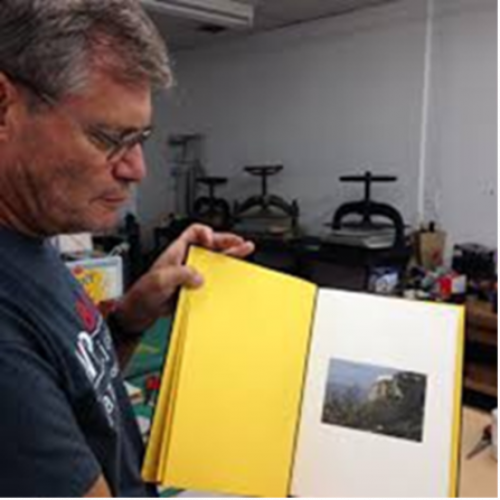The programming cooperative called Reflections of Community Outreach (ROCO) is a mainstay of KOOP’s news / public affairs offerings. Greg Ciotti administers the cooperative and participates in some of its shows. I spoke with him on October 14.
Michael A. Brown: You have produced and are still producing shows of your own and you also participate in other ROCO shows including mine. Tell us about the shows.
Greg Ciotti: Ten years ago, I started out wanting to apprentice in an interview format, and it was a local politics-based show. I then worked with Lisa Schepps on Off Stage On the Air. When the ROCO programmer at the time left, I moved into that role and recruited other programmers to do NPA shows on topics such as veterans, for example. Next came The Pilot Show, which was an experiment where other programmers did their demos. That evolved into the Community Pilot Show, where people from the community could get on the air. Now I do InTouch Interviews along with Lynn Cowles, which has focused thus far on information-sharing about Covid. I’m also with you and Perry Jefferies for Boots On the Air.
MAB: What are some of your most memorable shows?
Greg: We had a guest who had almost died of prostate cancer but survived because Obamacare health benefits came along at just the right time for him. The patient was Earl Arbuckle, who appeared along with his urologist and mine, and they were terrific. On World Kidney Day, we had several people who were waiting for or had already received transplants! And I recall so many other guests … and other KOOPers, too … who get to talk outside their usual content realms and help me get better as a broadcaster.
MAB: How did ROCO become a rotation of shows with different programmers?
Greg: I simply couldn’t do it all. But more importantly, my circle of contacts, organizations, and influences is limited. So the thought was if we have 4-6 people, the circle of content and perspectives gets much bigger. With more voices we can reach more diverse communities, and that’s been very successful.
MAB: What have been the challenges of producing and editing multi-cultural NPA shows, such as when the host and/or guests have English as a second language?
Greg: It is difficult but worthwhile. For example, I have interviewed Brandon Rummel, who cannot speak and who communicates by computer, which does allow him to speak electronically. He said he simply wants people to be patient and listen so he can be heard in his “voice.” That’s a model for all my guests … to make sure listeners hear them in their own voice, accented or not. There are people in the community who recognize exactly what the guests are saying, because they sound the same way.
MAB: ROCO shows sometimes include special celebrations – tell us about those.
Greg: The Community Council recognized the need to focus on special cultural and historical events. So we reached out to people from the community, and reached in to our own programmers and members, about what they consider important and valuable enough to feature. Martin Luther King Day came up. Stonewall. Juneteenth. Veterans Day. World Radio Day. Earth Day. International Woman’s Day. ROCO suggests the topics, but it’s up to KOOP programmers to bring the themes and content to life … and they do! Our listeners tell us they really like it.
MAB: Both KOOP and the FCC have particular requirements about NPA shows. What does the FCC want to know about our NPA shows?
Greg: We have to submit quarterly reports on who our guests are, the topics we cover, and the relevance of the guests and topics to our FCC license as a community radio station. They want to assure that we are serving our community as licensed. Of course, our diverse music programming also serves the community with content you’ll not hear on other stations.
MAB: ROCO is closely aligned with the Community Council. What sorts of initiatives is CC undertaking and what tangible results are they achieving?
Greg: Community Council’s role is to advise the Board of Directors and the General Manager on how to meet our FCC contract. We advocate for actions, so we have open houses, we do outreaches to community non-profits, we established a subcommittee on anti-racism, we do tabling at various community events. One of our most successful, and definitely tangible, results is we just won our second grant of $150k for producing radio about migration and immigration issues in central Texas. That means we are recognized as more than just a radio station … we are a nexus for exchanging community information.
MAB: How can/should KOOP and ROCO attract more programmers and members from under-represented communities?
Greg: We’re currently engaged with Austin Community College to nurture and mentor more people from their very diverse student body … 60% minorities. Part of KOOP’s mission is to teach and we are convinced that inclusion plus radio instruction will lead to more folks joining and then staying with KOOP.
Interview by Michael A. Brown
